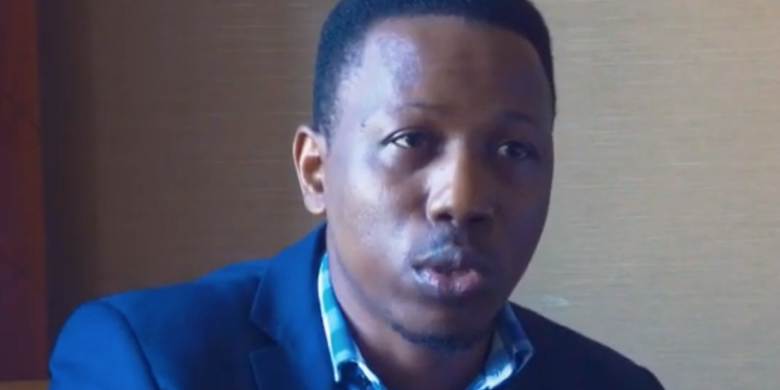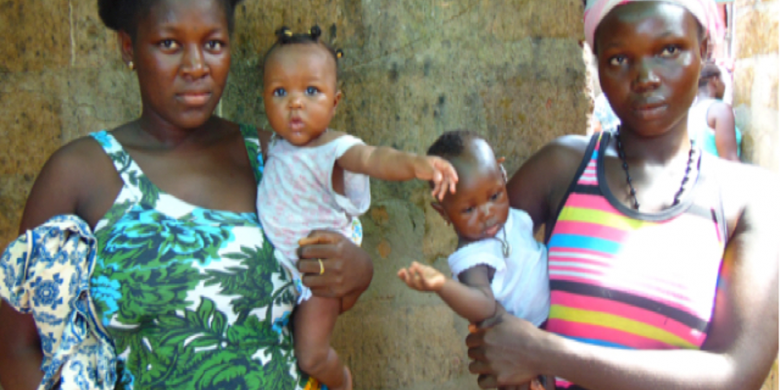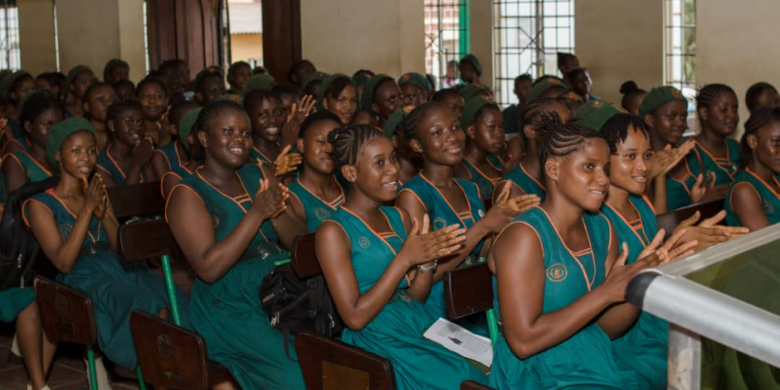
A Society is Only as Strong as its Most Vulnerable Members
At times of acute crisis, it is easy to lose sight of the bigger picture. A global pandemic, like the one we are facing today, is a perfect example of where our natural response is to focus solely on the aspects which are most acutely affected: a nation’s healthcare system and its economy. However, the trickle-down effect of COVID-19 can seriously affect other crucial areas of life, particularly peace and conflict.
CSPPS is launching this series of articles, which zooms in on the role of civil society in supporting local response action. Via interviews with frontline responders, we discuss the short-term and long-term effects COVID-19 is having on prospects for peace and stability in their countries.

From 2014-2016, a devastating wave of Ebola swept through Sierra Leone, infecting 8,704 people and killing 3,589, of which 221 healthcare workers. Four years later, after Sierra Leone had long been the only country in the midst of Liberia, Guinea and Côte d’Ivoire within the Mano River sub-region without a single case of COVID-19 recorded, the government confirmed its first case of COVID-19 on Tuesday the 31st of March.
President Julius Maada Bio declared a year-long state of emergency on Tuesday the 24th of March 2020, which was approved by the Parliament on Thursday the 26th of March 2020, allowing for border crossings to be monitored by military staff and police forces, reduced opening hours of markets and the closing of pubs and restrictions to restaurants in order to control an imminent outbreak.
For the first article in this series, the Secretariat of the Civil Society Platform for Peacebuilding and Statebuilding (CSPPS) spoke with Musa Ansumana Soko, Member of the Executive Committee of the Platform based in Sierra Leone, and Chief Executive of the Water, Sanitation and Hygiene Network (WASH-Net) on the wider effects of the coronavirus in the context of a post-Ebola Sierra Leone.

In an earlier interview with the BBC, Musa Ansumana Soko had discussed the need for increased access to water and sanitation across Sierra Leone, especially in light of health threats such as Ebola and COVID-19. In response to our question about whether there had been any improvements since, his answer was worrisome at best.
“Water is still coming from the same limited sources. … Existing sources are under a lot of extra pressure to meet the increasing demand for water in Freetown, for example. On a provincial level, connection to water systems is low, and the Sierra Leone Water Company is attempting to provide the much-needed supply to communities who are not connected to pipe-borne water. Alternative ways of supplying water are the installation of community points with tanks that are filled by water trucks.”
The most basic and essential measure to prevent the spread of the coronavirus, washing your hands with water and soap, is thus a nearly impossible task for a large part of the population of Sierra Leone. The alternative, alcohol-based hand sanitisers, has become a luxury item, with prices skyrocketing and stores running out all over Sierra Leone. A pandemic such as COVID-19 therefore immediately highlights the high level of inequality within the country: your income will determine how and whether you will withstand the ongoing pandemic. The poor, especially women and children, will be extremely hard hit. Tensions amongst the general population are therefore rising, and the effects of another societal breakdown would be devastating for the development of the country.
A 2014 article by another CSPPS member FriEnt, "Ebola outbreak rocks peace work in Sierra Leone", illustrates the massive setbacks the country could suffer in the event of a renewed epidemic. Tensions between healthcare workers and the general population rose due to high levels of mistrust and misinformation. The agricultural sector as well was hit hard, with farmers withdrawing from their fields to mourn their loved ones, resulting in a huge hike in food item prices all across the country.
Also this time around, fear and mistrust are increasing tensions across the country, as many healthcare providers are scared to even admit patients at this point, in fear of contagion. Rumours and misinformation, especially among the illiterate part of the population, add to this mutual feeling of mistrust. Last week, these tensions led to a country-wide pandemonium, when word came out from a local healthcare facility that a potentially infected woman, who travelled from Cameroon to Sierra Leone, was placed under careful observation and tested – after which the test results turned out to be negative.
The role of civil society in preventing unrest during the coronavirus pandemic
Musa Ansumana Soko stresses how COVID-19 affects every sector of life. The involvement of the public and civil society organisations (CSOs) in the fight for a resilient society during COVID-19 is therefore more important than ever. The wider citizenry is calling for greater civil society engagement, but most of the COVID-19 precautions thus far have been government-led. Resilience is key, with or without COVID-19, and for that, every state needs to provide CSOs with their legitimate space to be able to do their part.
One aspect that civil society is becoming heavily involved in, however, is the eradication of misinformation, and the spread of COVID-19 informative messages to the more remote communities. WhatsApp is proving to be one of the most convenient channels for the purpose of raising awareness, but also local radio stations could be involved in this process.
Moreover, civil society proves to be highly valuable in the process of monitoring and of reporting on actions at the local level, as well as community education. Influencing the delivery space within the government is highly relevant in this situation, in addition to raising the profile of sensitive issues affecting equity, inclusion and citizen participation. The added layer of socio-economic inequality raises the level of complexity of the current situation, calling for a holistic focus on the crisis at hand. Health security is paramount, but other societal aspects such as marginalisation, exclusion, conflict and security are more relevant than ever.
“A society is only as strong as its most vulnerable members"
For Musa, “A society is only as strong as its most vulnerable members", and a lack of response to the needs of those most vulnerable members will have great repercussions for the overall stability of Sierra Leone. Medical technologies alone are not enough to prevent a new epidemic: the trust of the communities is needed for a controlled outcome.
The importance of implementing well-accepted control measures in the event of an outbreak is therefore of the essence. Musa Ansumana Soko emphasises that, to avoid a complete societal and economic disruption akin to that of the Ebola outbreak, we need a focus on resilience and trust nationwide, as well as across our national borders. We also need an overview of the local needs, at all levels of society, and civil society needs to be a part of both raising awareness as well as the efforts to coordinate the crisis at hand.
How then do the International Dialogue on Peacebuilding and Statebuilding (IDPS) and the CSPPS come into play here?
Disease outbreaks like these are global: what better way of dealing with a global issue by creating a cross-country response? “Working collaboratively against the virus deepens community trust in the response process”. Showing global solidarity only adds to this. Rolling out and implementing the IDPS 2019-21 Peace Vision in this context is particularly relevant: we, as a global civil society, need to foster national cohesion and support inclusive participatory responses for more effective and sustained peacebuilding and conflict prevention.
Musa Ansumana Soko sees that key national CSOs are claiming that necessary space for involvement themselves, and are addressing the issue of accountability based on lessons from the Ebola response. They are, however, “still very much in the process of strategically fitting themselves into the drive to prevent an uncontrolled outbreak, detect possible cases as well as being a part of the response when it happens.”
Building support across CSPPS aids in creating a space for listening and learning, and to share and explore what CSPPS can offer on a cross-country basis. As CSOs find themselves restricted due to the precautions surrounding COVID-19, taking up their usual role in claiming more involvement or further advocacy is also limited. As CSPPS, we ought to provide support in finding new ways of remaining engaged, even during times of (partial) lockdown.
“CSPPS being an essential stakeholder in providing spaces for civil society, and deepening [our] engagement with states and citizens can play a significant role in identifying current challenges, while exploring concrete support needs to accompany civil society engagements in [our] respective countries. Especially in a trying period like this, where limited resources exist to operationalise civil society engagement.”
At the moment, a joint CSO Coordination meeting amongst all Sierra Leone CSPPS country team members is scheduled for the 3rd of April, in order to take a clear and united position from the part of civil society. Although this holds a lot of resource implications, early-on action is vital in defining further needs in terms of support as the situation unfolds. The Sierra Leone country team is reaching out to CSOs at the grassroots level to advance the prevention agenda by communicating and agreeing upon pre-agreed messages. Yet, due to the recent declaration of a state of public emergency, the constitution is suspended. This leaves the issues of collaborative governance, as well as peacebuilding, very much up in the air.

“Priorities should be anchored on building resilience, while addressing the major issues of fragility and breakdown in governance systems and institutions. The Infrastructure for Peace (Peace and National Cohesion Commission) must form part of those priorities for action, while at the same time taking along urgent needs for fully implementing Women/Youth Peace and other security agendas.”
CSPPS is committed to bringing peace and resilience across the globe, especially in times like these. This article is the first in a series of articles on the role of civil society in supporting local action during COVID-19. We hereby reach out to the global community, and to each other as CSPPS members, making the voices of civil society heard. Short-term, emergency response and humanitarian aid in times of crisis are undoubtedly invaluable. However, a long-term vision by working across the Triple Nexus of humanitarian, development and peace in order to build resilient societies worldwide is quintessential. Especially now. Especially in a time of unprecedented global chaos. We are all in this together. The time to act on truly sustainable peace is now.
Article by Charlotte de Harder - CSPPS
